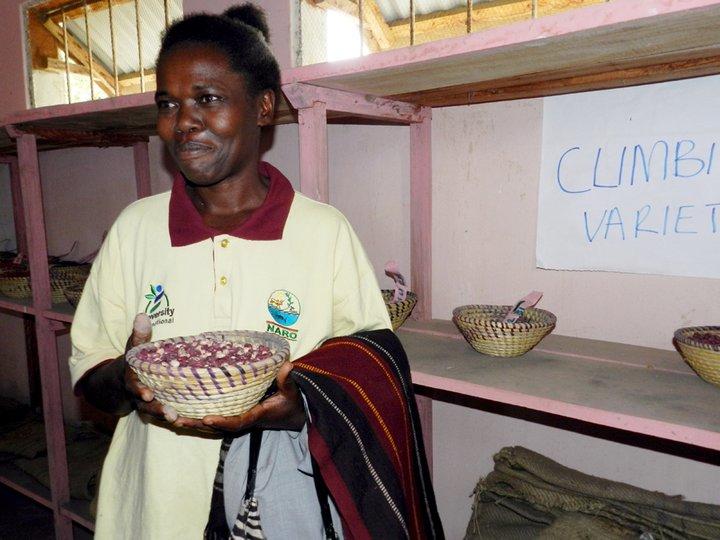Women of the Kizibi community seedbank

Every year on October 15th, the UN celebrates International Day of Rural Women to honour and recognize the importance of rural women in enhancing agricultural rural development worldwide. The following story highlights the role of women in community seedbanks in Uganda.
Every year on October 15th, the UN celebrates International Day of Rural Women to honour and recognize the importance of rural women in enhancing agricultural rural development worldwide. The following story highlights the role of women in community seedbanks in Uganda.
Community seedbanks play a key role in conserving crop varieties, which contribute to food security, sustainable agriculture and agricultural biodiversity. Most seedbanks are run by farming communities, allowing farmers to share traditional knowledge and responsibilities in the management and maintenance of the seedbank.
Women farmers are active custodians of traditional crop varieties and they often play key roles in managing and maintaining seedbanks. In many cases, their participation and involvement in community seedbank activities, contributes to their economic empowerment by giving them the opportunity to interact with buyers and also play a major role in meetings and decision-making within the seedbank.
Kiziba community seedbank in Uganda was established during a project seeking to improve productivity and resilience for farmers through the enhanced use of crop varietal diversity, primarily focusing on common bean (Phaseolus vulgaris) and banana (Musa spp). The project had a positive effect on many of the women since the common bean is primarily managed and maintained by them.
Throughout the project, activities were undertaken to better understand the stress and factors that were hindering their use of diversity, and to enable both men and women to participate and contribute to the management of the project. Both men and women were included in the technical committee, the National Implementation Unit, and the site coordination committees that were spearheading the implementation of this project. In addition, they also participated in various project activities such as farm trials, community project meetings, capacity building workshops, cross site visits and diversity fairs to share experiences about managing and benefiting from crop diversity including the benefits from community seedbanks.
Kiziba community seedbank is greatly benefitting its community by providing good quality seed which when planted and managed well, gives improved yields thus increasing the communities' food security. It is specifically proving to be advantageous to women by providing them with skills of common bean management - leading to increased yields - and leadership opportunities. The management committee has six female farmers and 60% of the beneficiaries from the common bean seed so far, are women. In addition, women are selling the surplus common beans for further empowerment and financial stability.
Discover more by reading Community Seed Banking for Improving the Resilience of Farmers; the case of Kiziba (Kabwohe) seedbank in Uganda
The blog has been written by Alexandra del Castello, Intern at the Development Impact Unit, based on the above-mentioned case study compiled by Rose Nankya, National Project Manager, Crop Genetic Diversity for Pest and Disease Management.
Photo credit: A farmer holds a bowl of common beans conserved at the Kiziba community seedbank. Credit: Bioversity International/D. Jarvis
